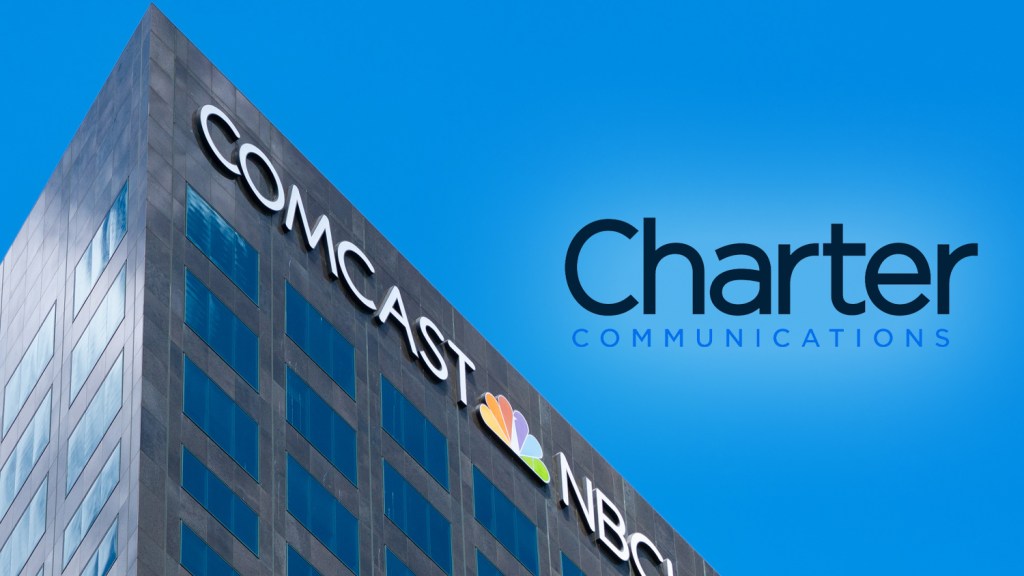Charter CEO Chris Winfrey acknowledged the “chatter” in the media business and on Wall Street about a potential merger with Comcast, but said such a megadeal is not “core” to his company’s strategy.
During a conference call with analysts to discuss Charter’s better-than-expected fourth-quarter results, Winfrey was asked directly about a Comcast tie-up and his view of M&A more broadly. The top exec didn’t completely rule out dealmaking, but said closing a transaction with another major player won’t necessarily be any easier during the Donald Trump administration.
“I know there’s a lot of chatter out there” about Comcast, Winfrey said. But Charter’s strategy, he continued, “has never been dependent on M&A. In fact, it’s really been moving purely from an organic growth perspective, and how do we create value for shareholders from that perspective? You do that by being a great operator. You do that by saving customers lots of money, providing great service.”
Analysts at Wall Street firm TD Cowen & Co. this month promoted the combination in a note to clients. “We believe a Comcast/Charter merger could make industrial logical sense given the scale and subsequent massive synergies,” they wrote. The two companies already participate in a joint venture on connected-TV service Xumo.
Major Charter shareholder John Malone has advocated for industry consolidation, saying regulators have allowed the tech industry to “run wild” while handcuffing traditional sectors like cable. “Charter should be allowed to merge with Comcast or Cox or anybody, to reduce costs and improve quality of the service they provide,” he said at Liberty Media’s investor meeting last November.
Running a business well, Winfrey acknowledged, “opens acquisition opportunities over time.” Still, he said combining with a large-scale peer won’t be as straightforward as it was a decade ago when Charter bought Time Warner Cable, vaulting to the top of the market-share charts. “The rest of the cable industry, if you sit back and think about it, it’s all family-owned or family-controlled,” he said. “So, it’s in the hands of these families or family-controlled businesses that get to decide when’s the time that they’d like to combine.”
Cable television began as an industry led by maverick entrepreneurs like Malone, Charles Dolan, John Rigas and Comcast founder Ralph Roberts creating what would become multi-generational empires. Roberts’ son, Brian Roberts, is CEO of the media giant that started out as a small, regional cable outfit.
Beyond the family control element, Winfrey said, is the complicated matter of regulatory review. Charter and Comcast are the top two pay-TV operators in the U.S., but their footprints are steadily shrinking due to cord-cutting. A similar combination of major distributors – satellite operators DirecTV and Dish – fell apart last November when creditors of Dish parent EchoStar objected to terms of the proposed merger.
While the Charter-connected CEO of Warner Bros. Discovery, David Zaslav, and other media bosses have predicted a surge of M&A under Trump, Winfrey is not convinced. The first Trump administration saw some deals travel a smooth and efficient path through regulatory review, but personal grievances also threw a wrench in at times. Trump’s friction with CNN was understood to have motivated an antitrust lawsuit brought by the Department of Justice to try to block AT&T’s acquisition of Time Warner. A judge sided against the DOJ and the deal ultimately closed after nearly three years of red tape.
“The door for M&A, there’s also a lot of chatter that it’s wide-open,” Winfrey said. “But I don’t think it’s wide-open. I think any M&A transaction that you do under any administration has to be good for customers, has to be good for jobs. And when you think of our organic operating strategy that drives growth, that’s been helpful in that respect in the past with our ability to get things done. But it’s a potential add-on to our strategy, but it’s not the core of our strategy and it’s not the only way that we can create value.”



